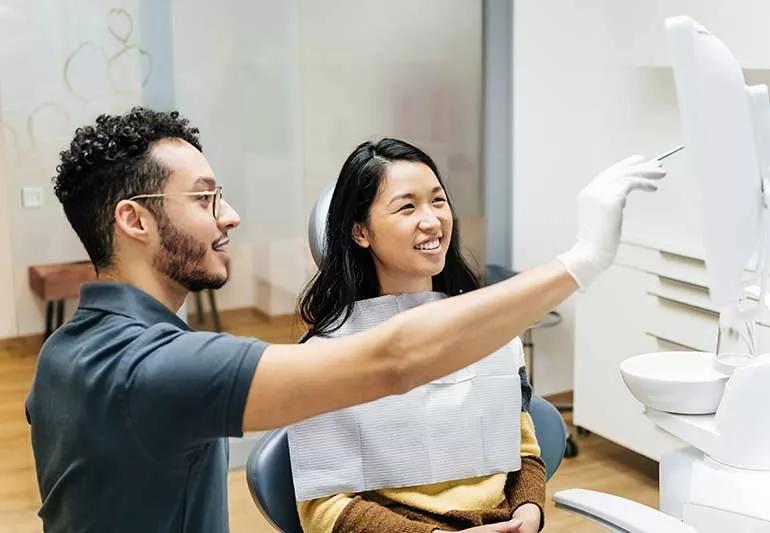Communicating, establishing stop signals and even listening to music can help

Image content: This image is available to view online.
View image online (https://assets.clevelandclinic.org/transform/1e98680f-fe9f-4529-bbdb-f27ab8008e8c/Dental-Anxieties-1402885896-770x533-1_jpg)
dentist and patient talking
You know you’re supposed to visit your dentist regularly. But getting that appointment on the calendar can be tough — and not just because of your busy schedule.
Advertisement
Cleveland Clinic is a non-profit academic medical center. Advertising on our site helps support our mission. We do not endorse non-Cleveland Clinic products or services. Policy
Whether it’s the sterile smell, the buzzing and drilling sounds in the background, or the thought of someone being up close and personal in your mouth, going to the dentist can be unpleasant and stress-inducing. In fact, as many as 1 in 3 people report experiencing anxiety about dental appointments.
If that sounds like you, there are ways to minimize and manage your unease, says dentist Betty Haberkamp, DDS.
What does dental anxiety feel like? According to Dr. Haberkamp, dental anxiety is when you have an uneasiness or worry about an upcoming dental appointment.
“Dental anxiety is less severe than dental phobia,” she clarifies. “While a person with dental anxiety might be uncomfortable going to the dentist, they’re not cancelling appointments or getting physically sick over them.”
If you’re wondering whether you should talk with your dental provider about your fears and worries, the answer is definitely yes. If your provider knows what your fears are, they can better work with you to determine the best ways to make you less anxious and more comfortable.
Here are some strategies to help you cope:
Advertisement
There are a number of reasons people avoid the dentist, including:
If you’re panic-stricken or terrified at the thought of a dental cleaning or procedure, that could be a sign of dental phobia. People with a dental phobia do everything possible to avoid going to the dentist — perhaps only going when extreme issues force them to. They know that this fear is irrational but are unable to do much to change it.
Other signs of dental phobia include:
If you’re still experiencing dental anxiety, or even dental phobia, you might benefit from working with a behavioral health provider.
Advertisement

Delivered every Tuesday!
Sign up for our Health Essentials emails for expert guidance on nutrition, fitness, sleep, skin care and more
It's a letter about the news!
Learn more about our editorial process.
Advertisement
Identify your triggers, set ground rules for your break and start practicing mindfulness
Too much screen time and unrealistic expectations and perceptions and can lead to an increased risk of anxiety and depression
Although different conditons, they can occur together or cause one another
If the thought of the gym sends you spiraling, do some prep work beforehand and bring a friend along for support
Stay merry and bright by knowing your triggers and journaling throughout your visit
There’s no evidence to prove this supplement can help with weight loss, and it may come with risks
Being the center of attention doesn’t mean you have to exile your guest stars
Focus on a positive mindset, strong study habits and healthy living
Type 2 diabetes isn’t inevitable with these dietary changes
Applying a hot or cold compress can help with pain
Pump up your iron intake with foods like tuna, tofu and turkey